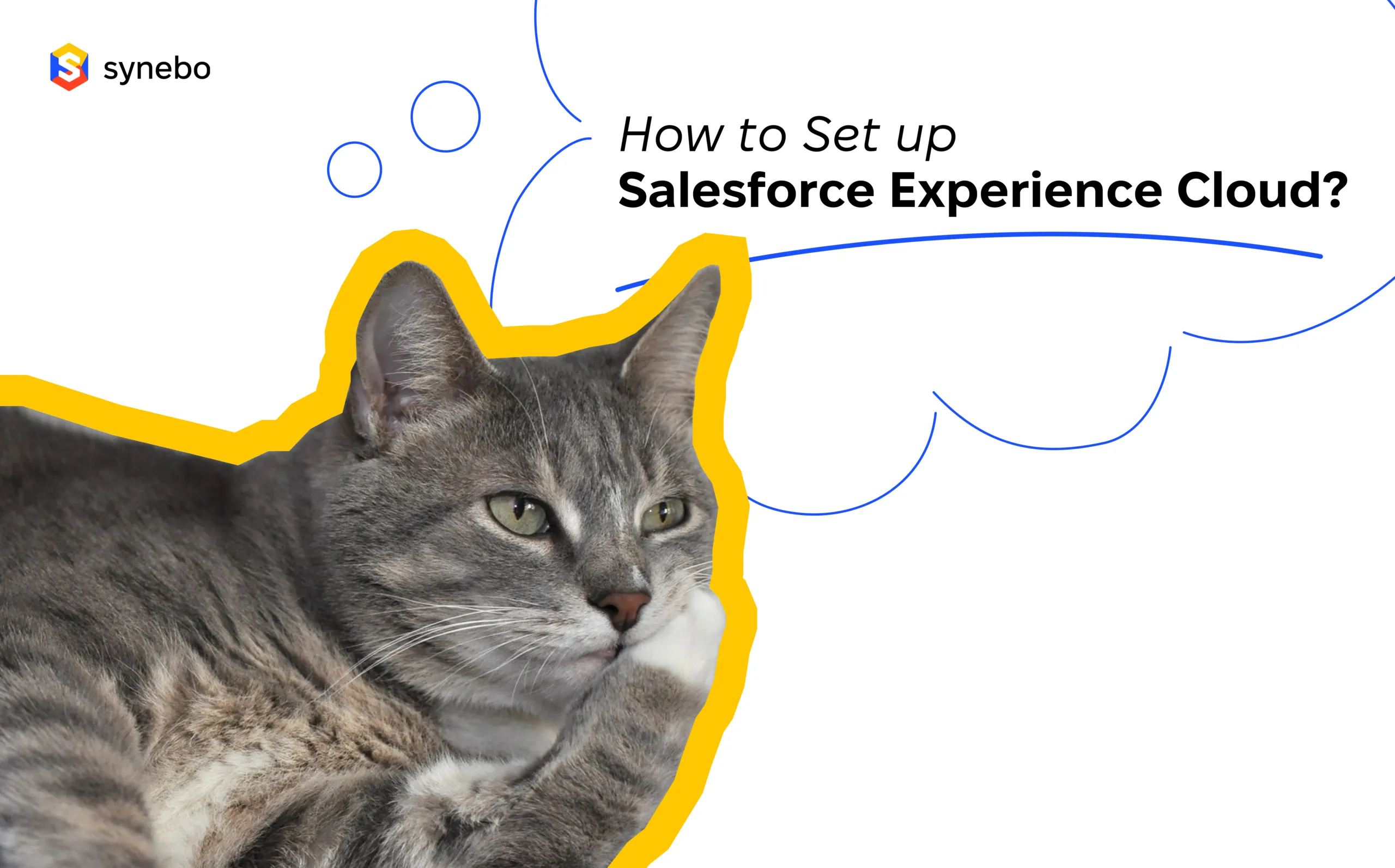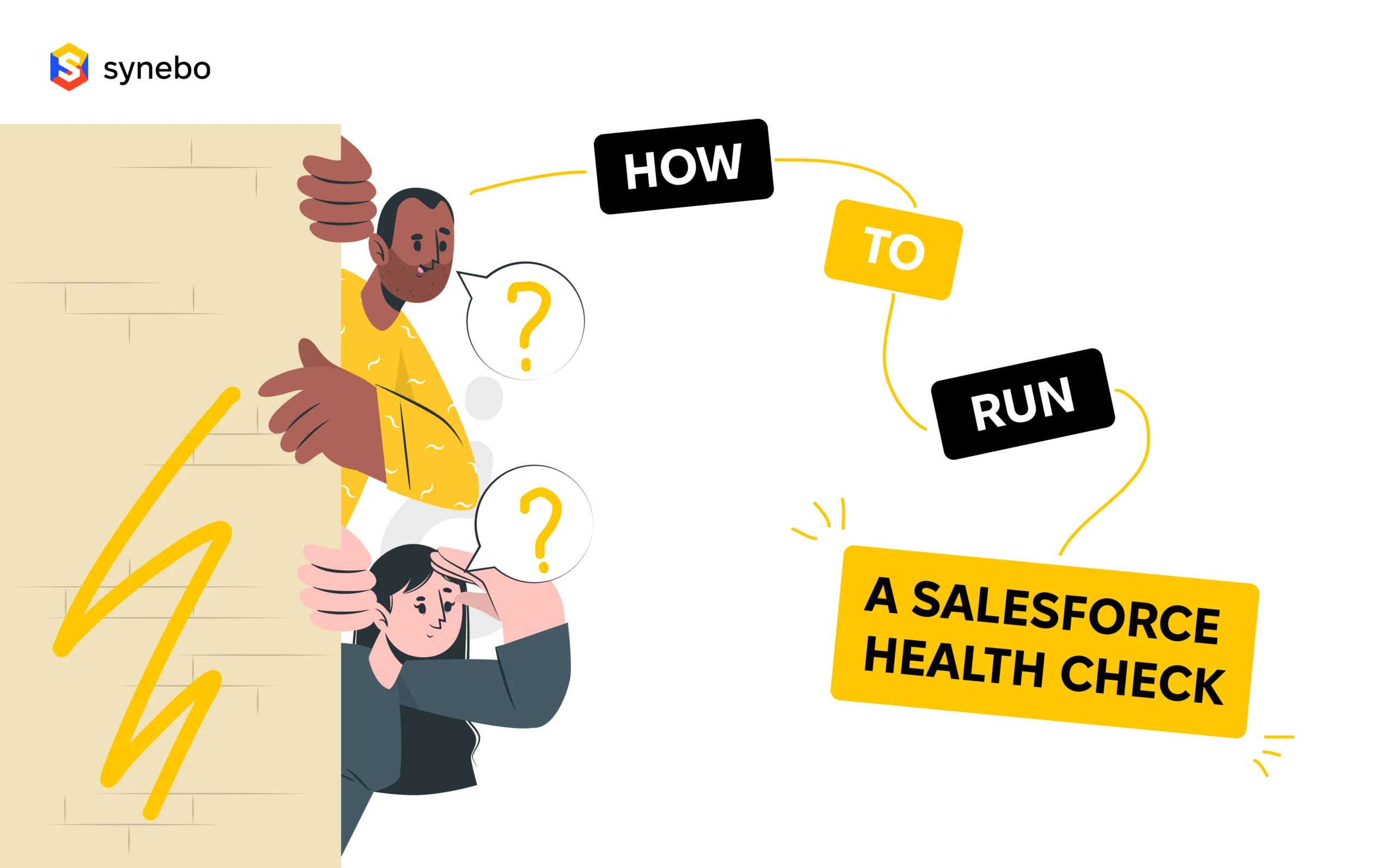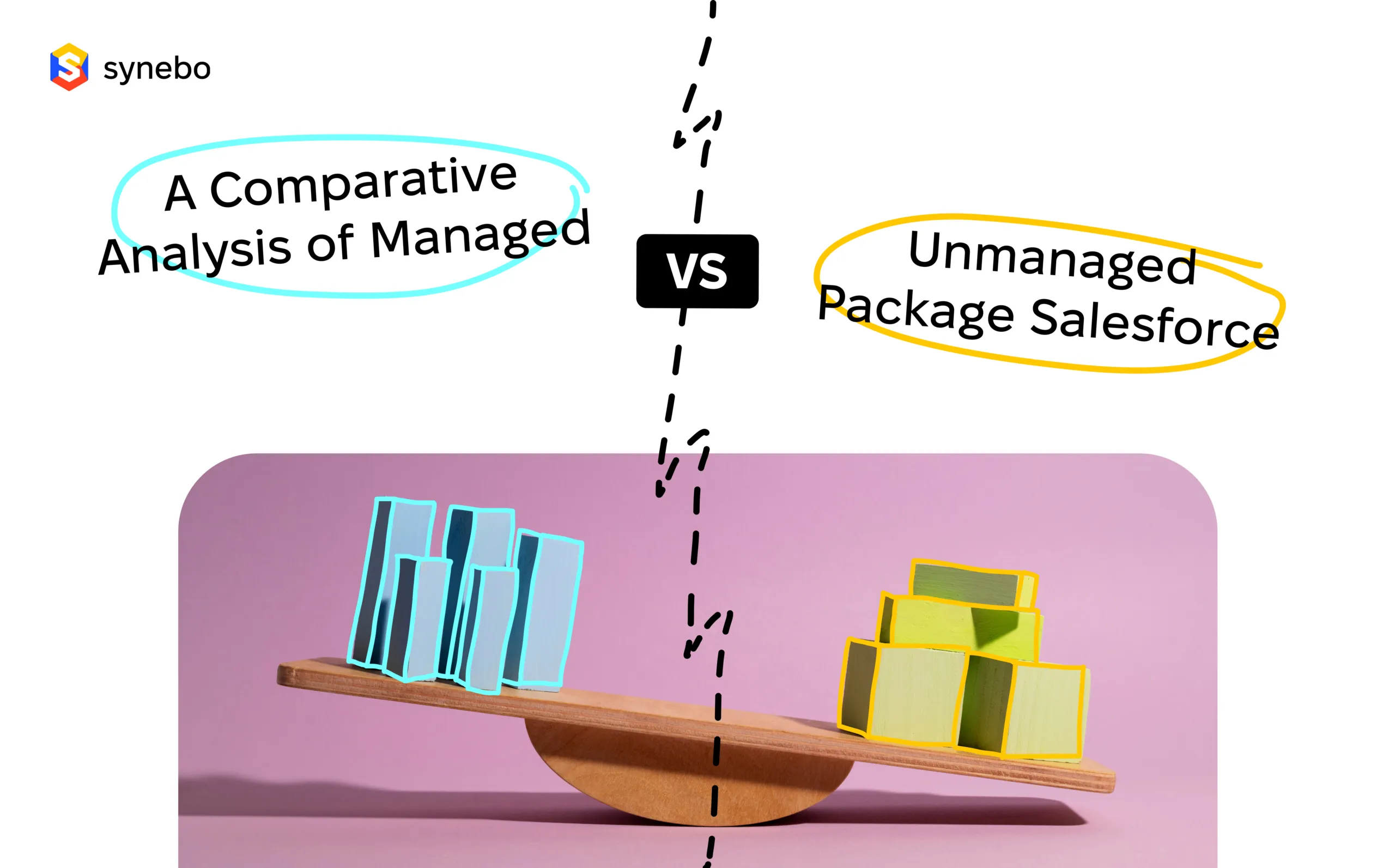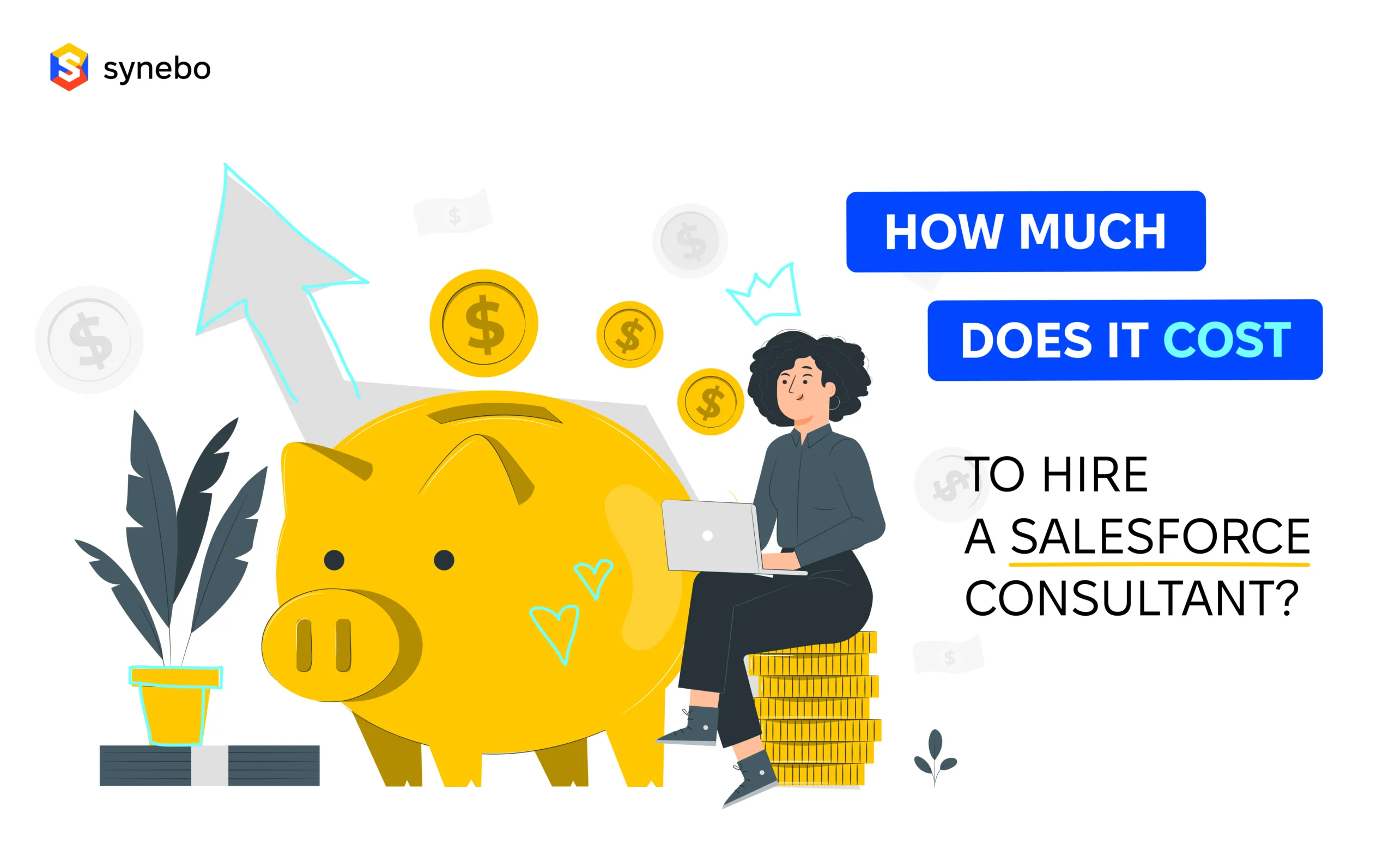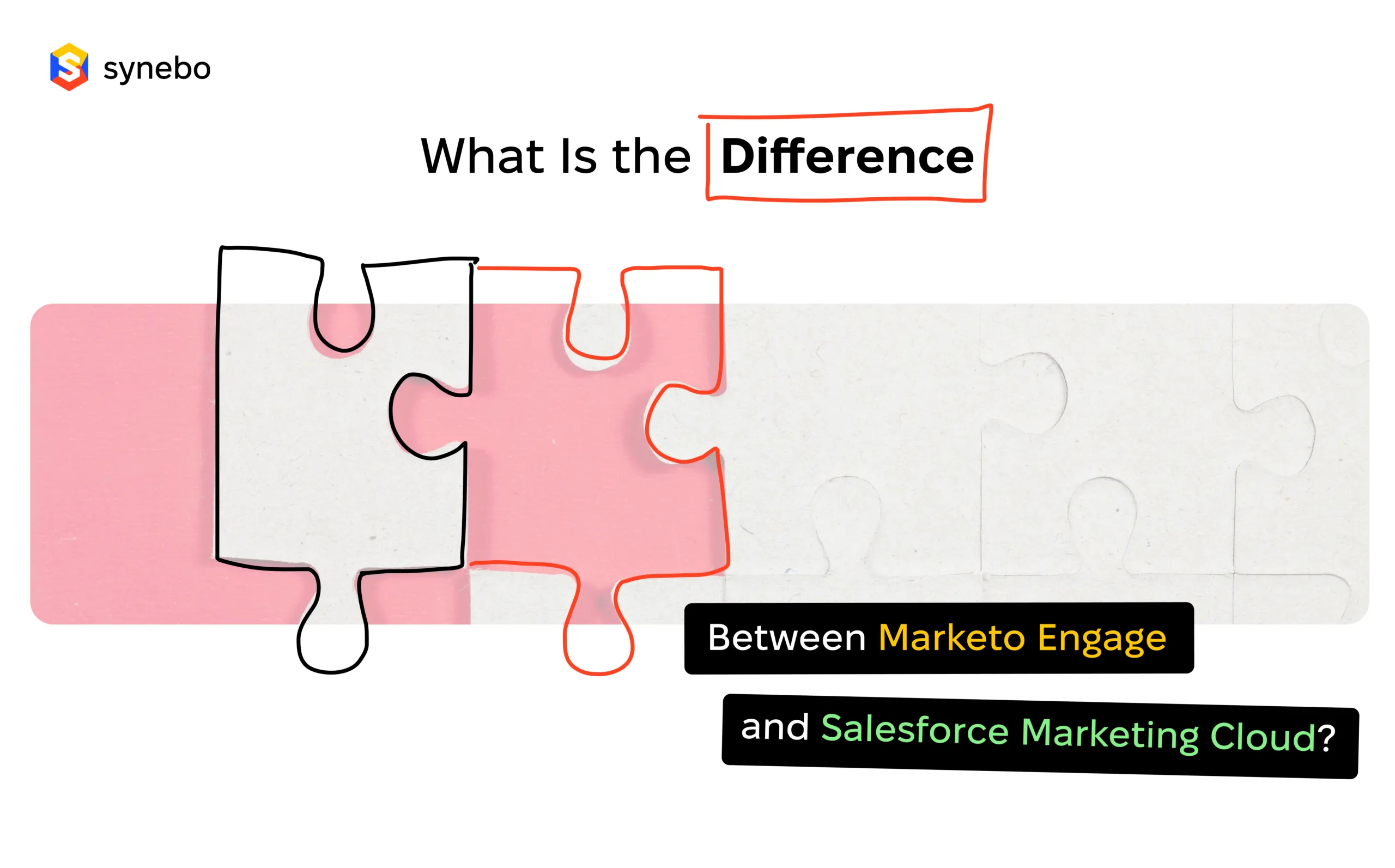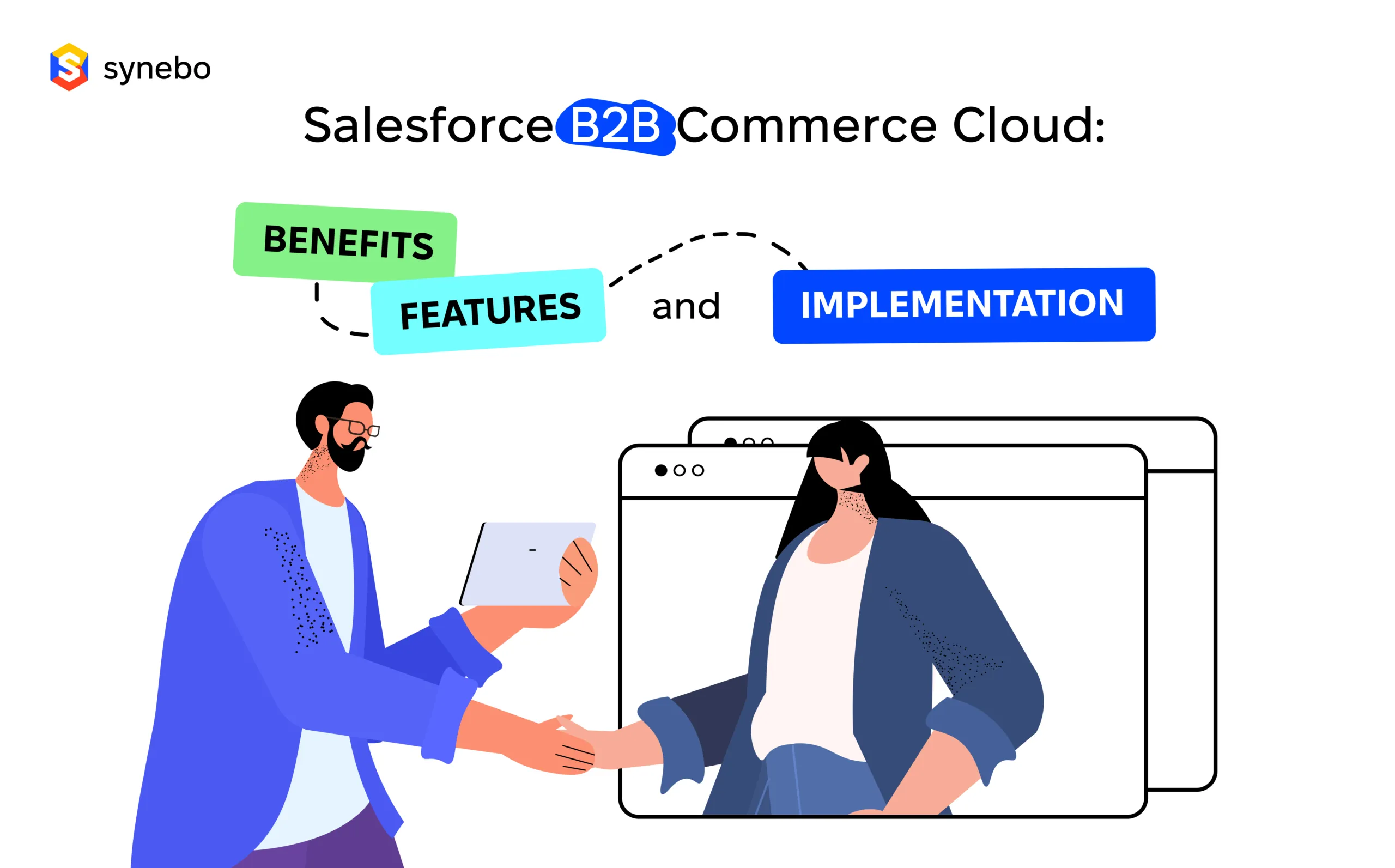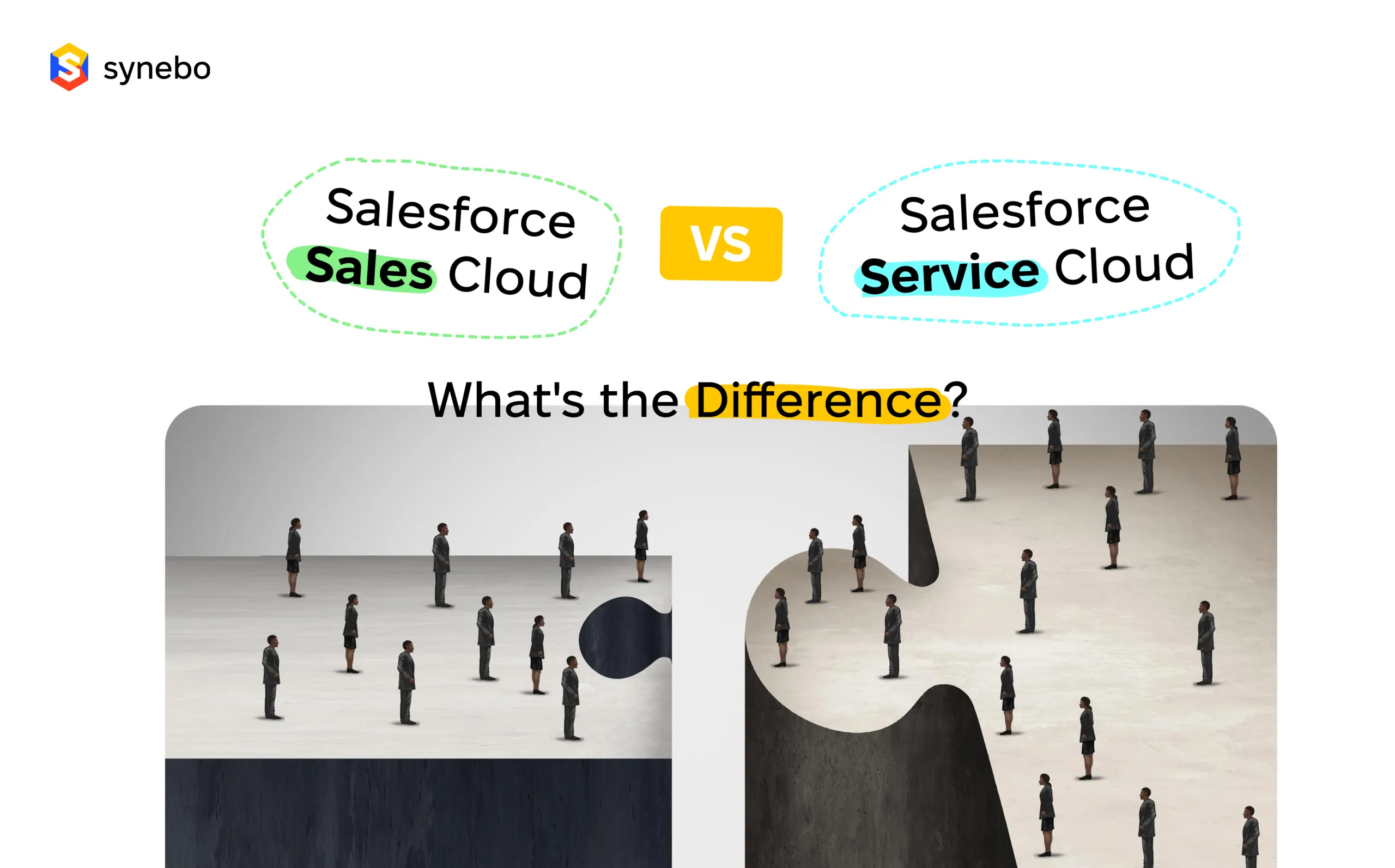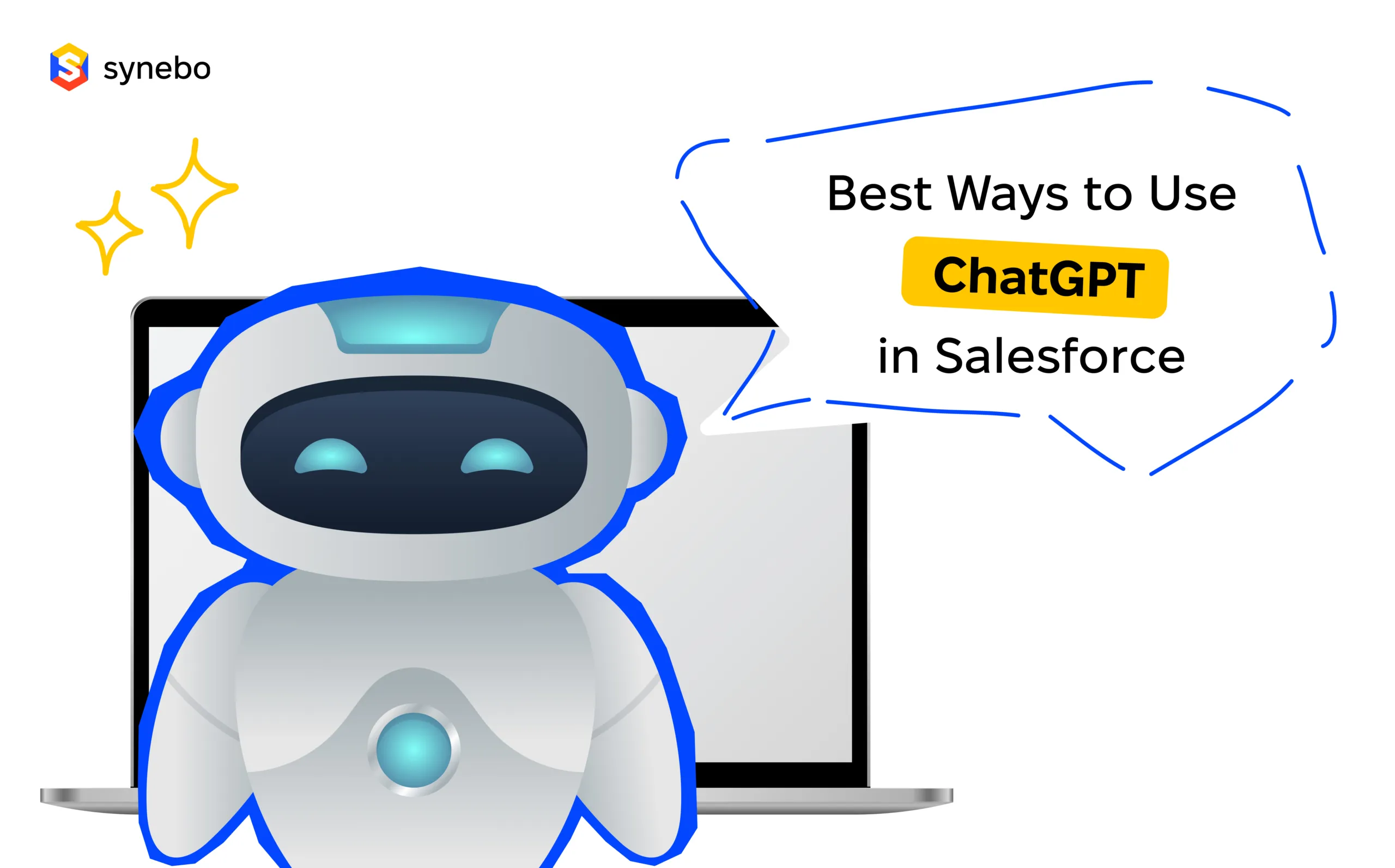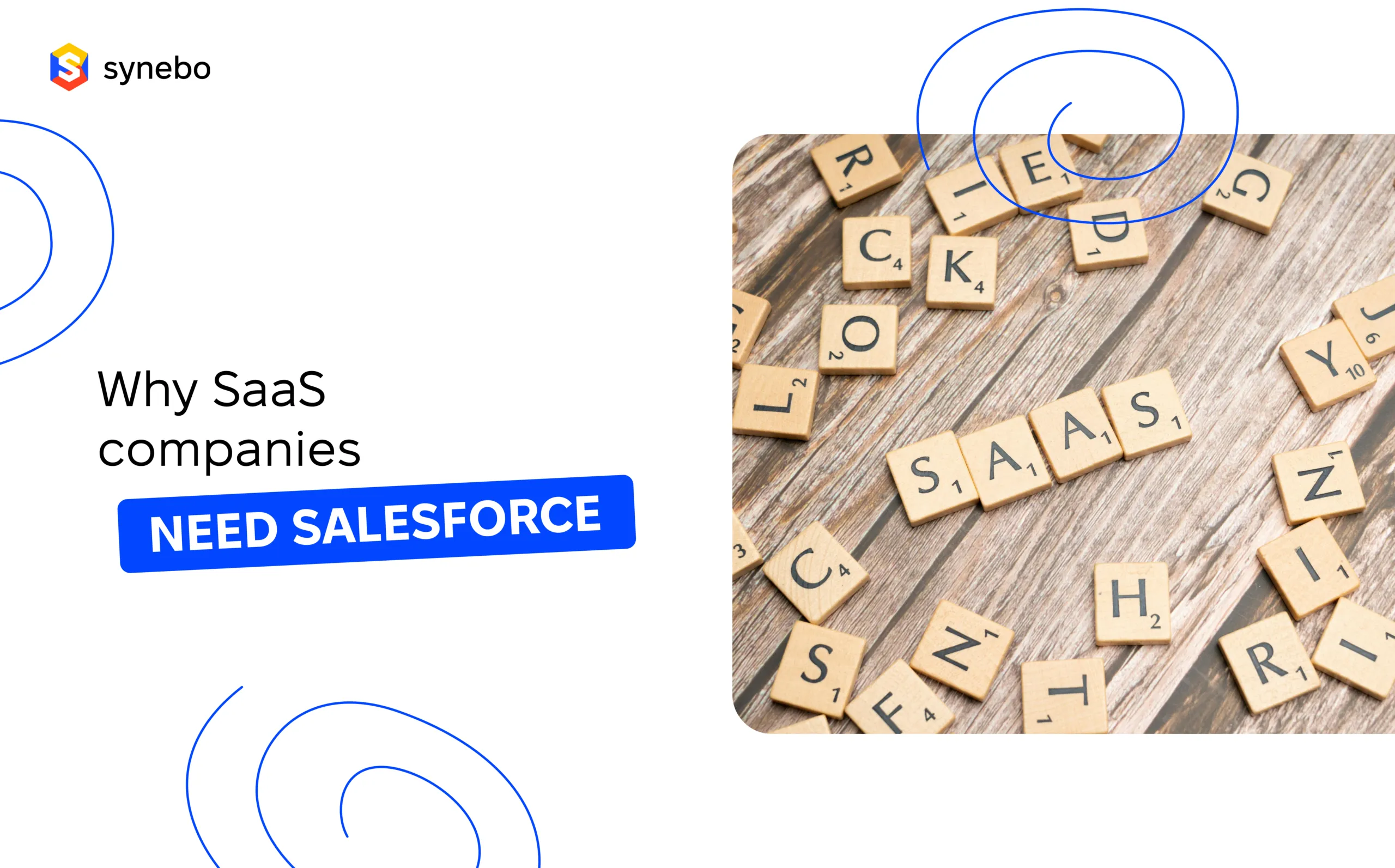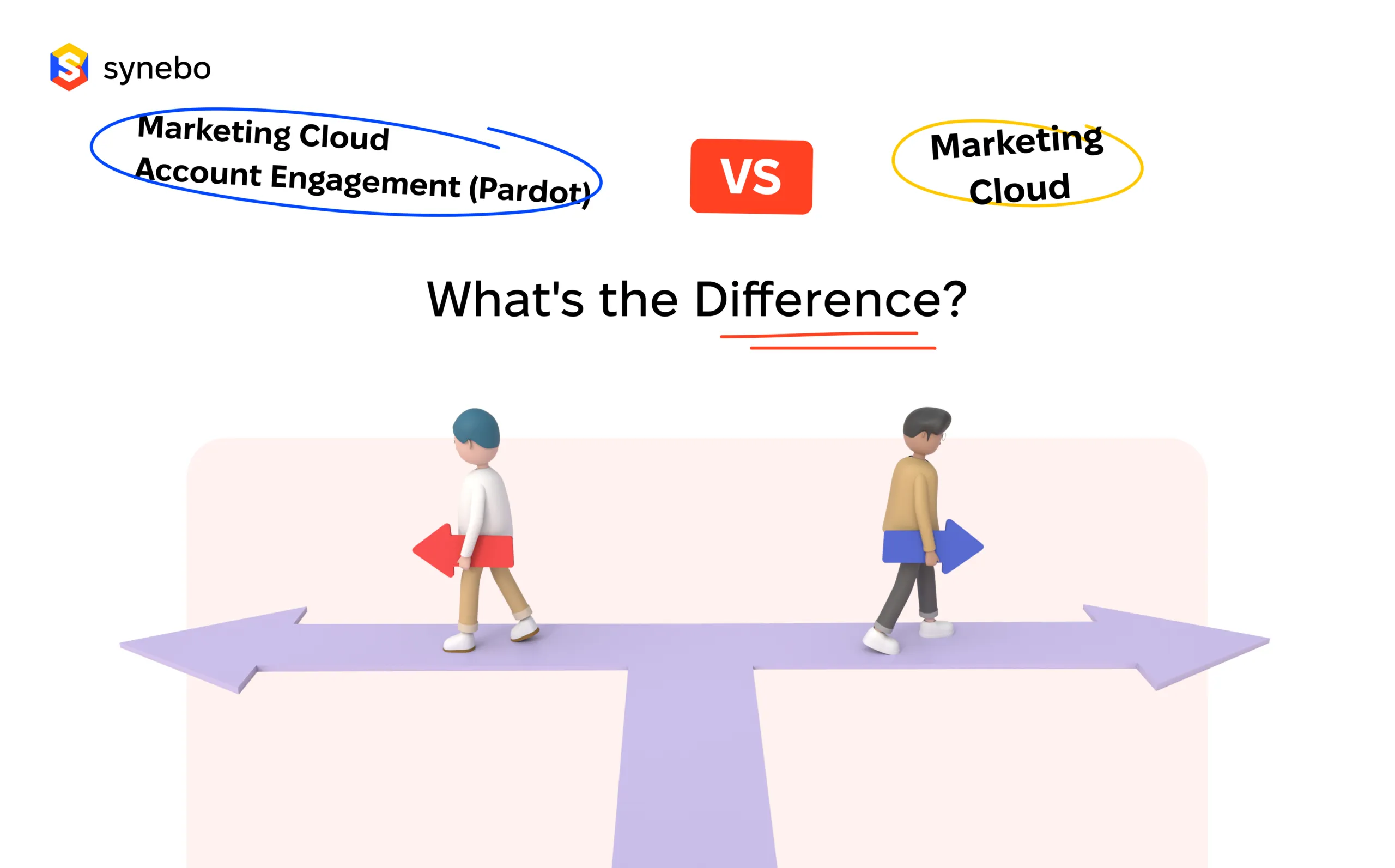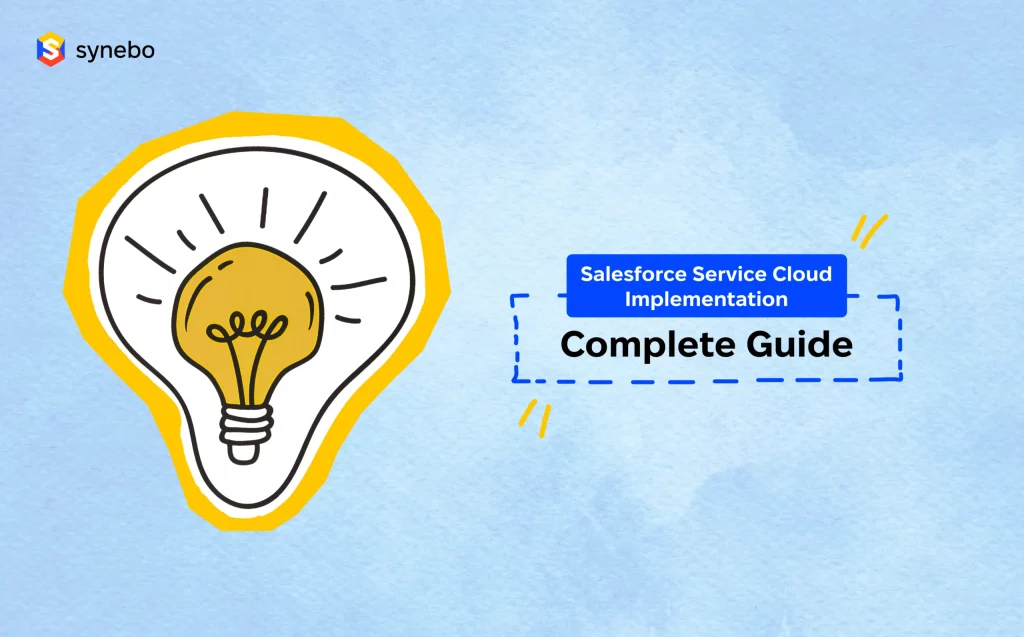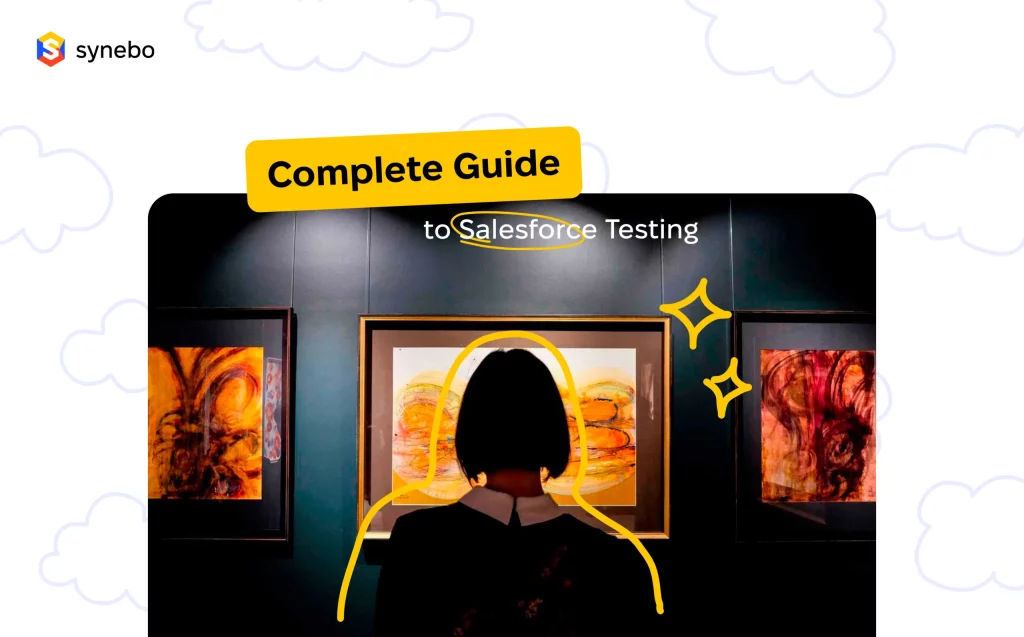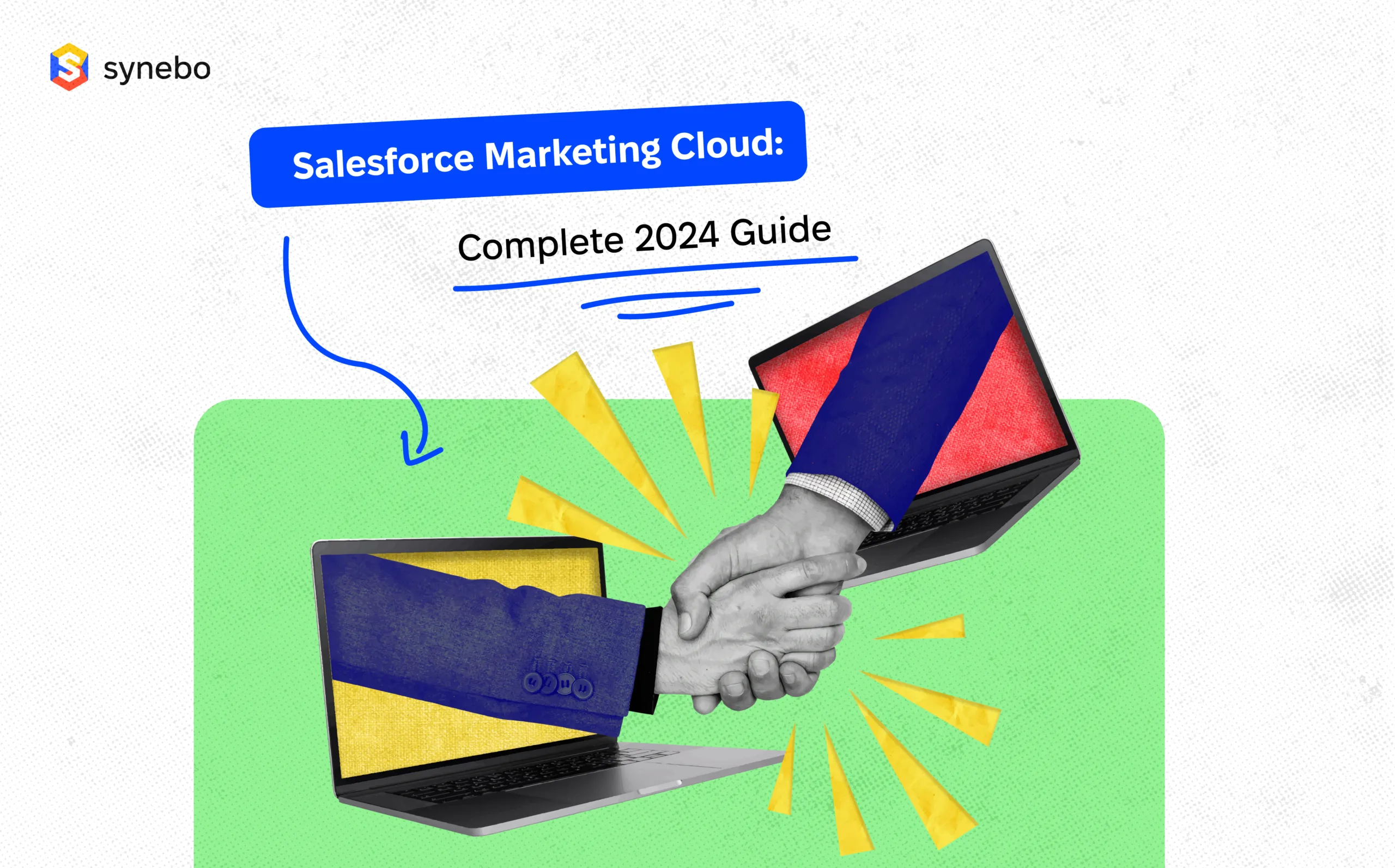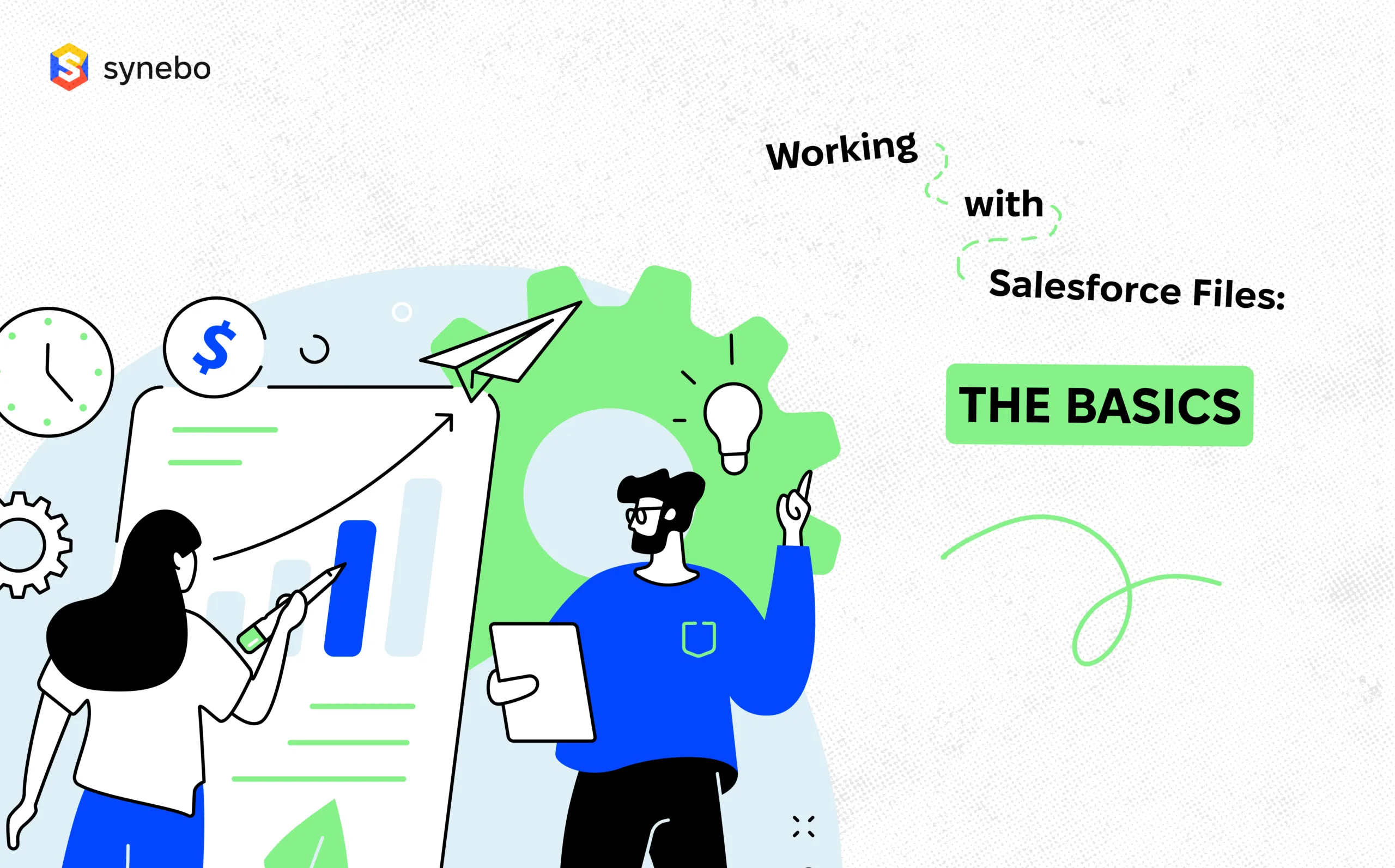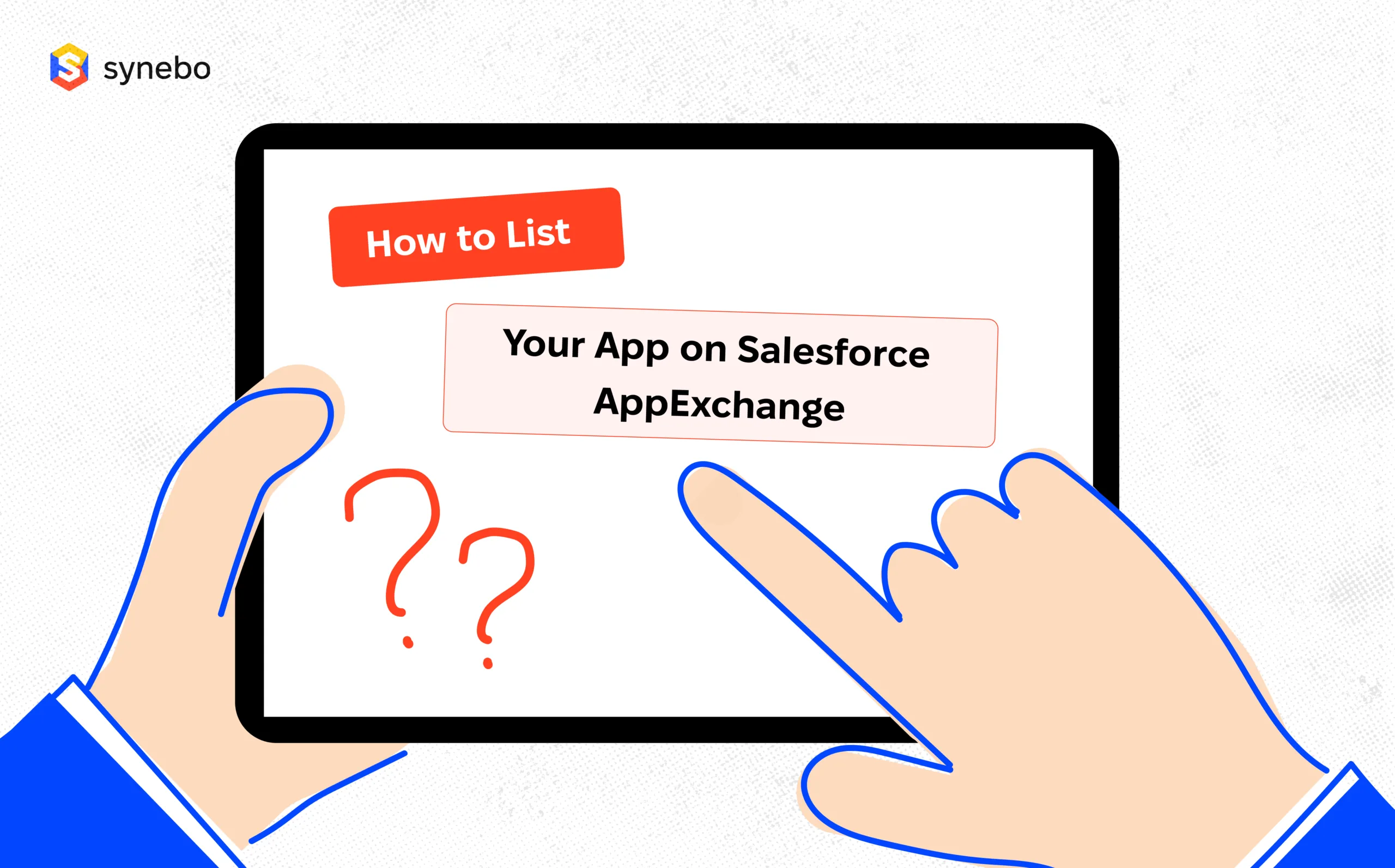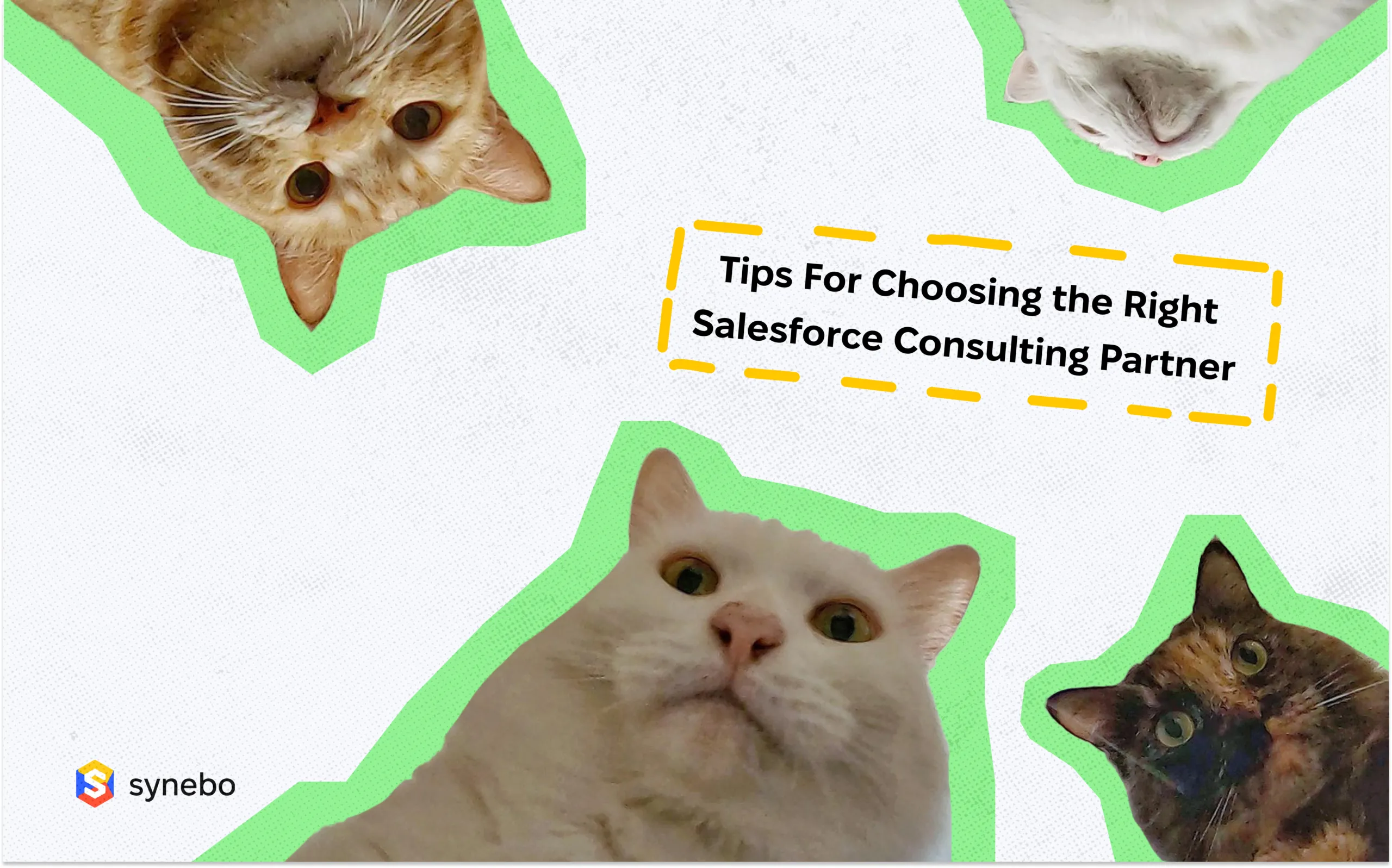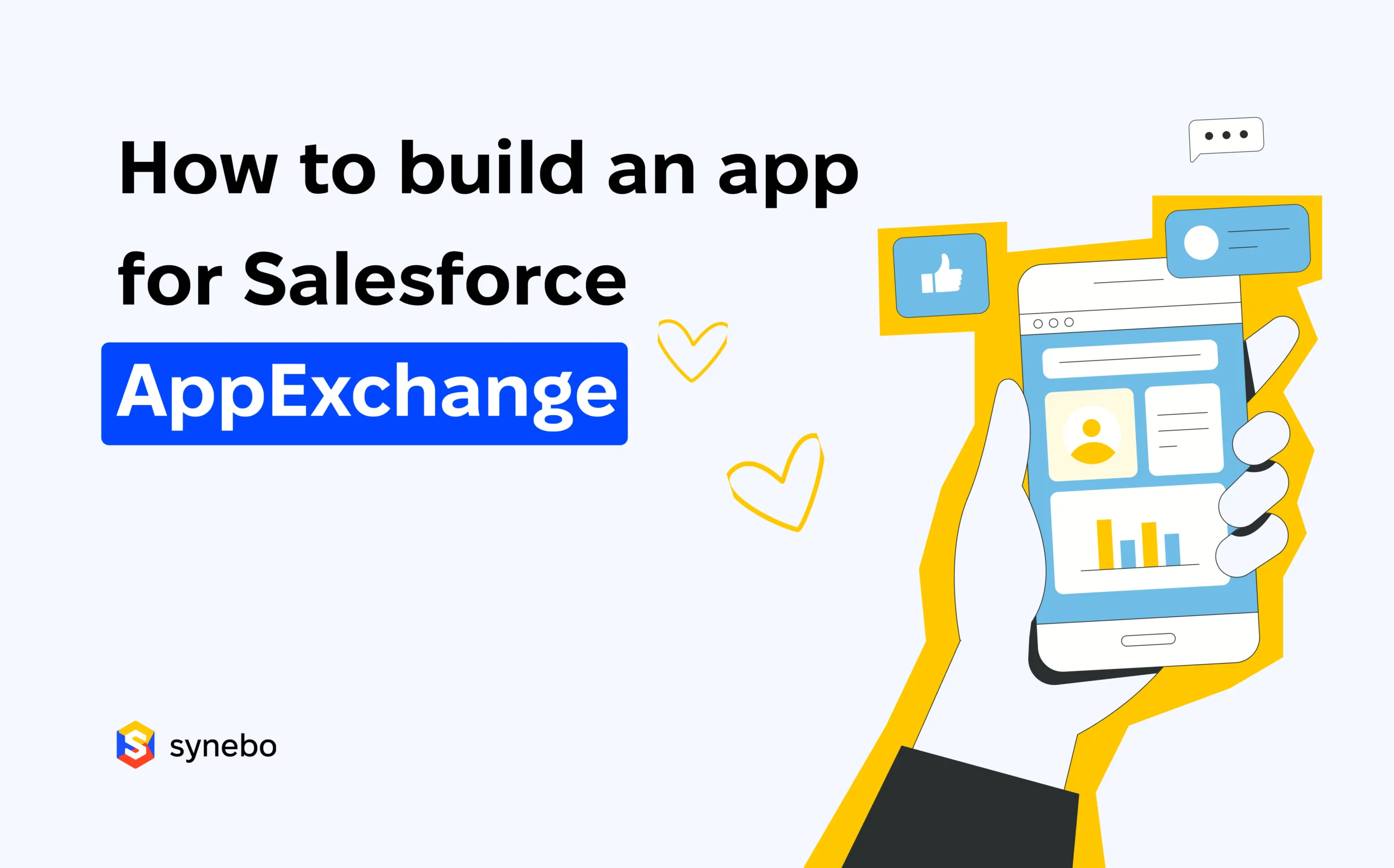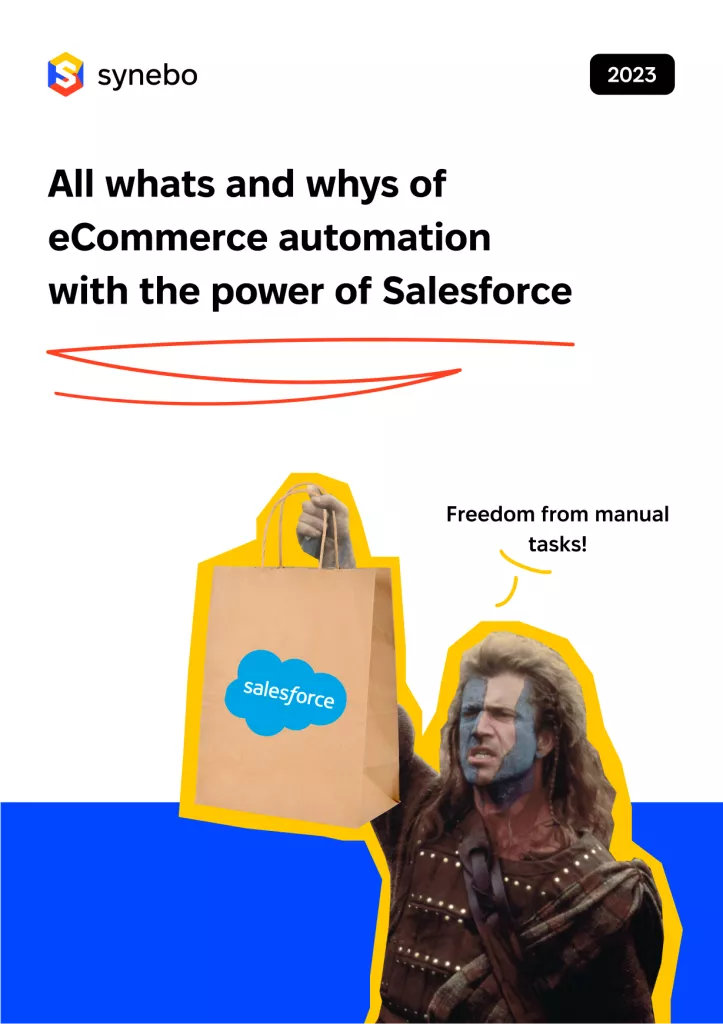15 Types of Salesforce Clouds
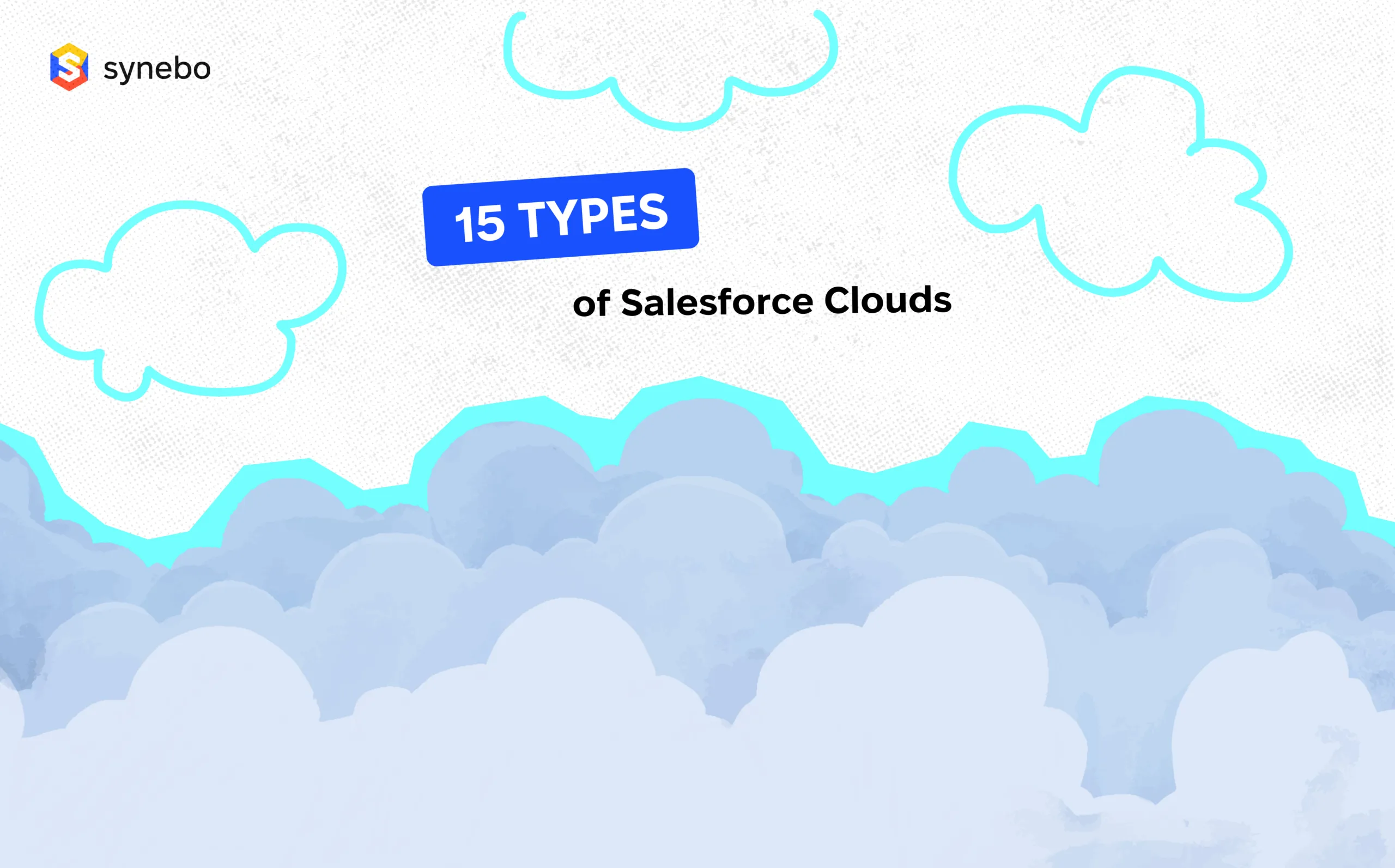
In the dynamic field of cloud computing and customer relationship management (CRM), Salesforce stands out as a versatile and comprehensive platform. It services for sales management, customer services, marketing automation, data reporting, and more.
Statistics show that the public cloud computing market is growing at impressive rates, amounting to $563 billion in 2023 already. Considering that Salesforce, a company specializing in cloud computing, has been the top 1 CRM platform for 10 consecutive years, it’s safe to claim that the niche is thriving and Salesforce leads it.
In this post, we’ll find out more about the Salesforce cloud concept and explore the fifteen distinct types of Salesforce Clouds, shedding light on their individual features and the specific business needs they address.
What is a Salesforce Cloud?
For starters, let’s define the term:
Salesforce Cloud is the suite of cloud-based applications and services offered by Salesforce. It is designed to streamline business operations.
Salesforce Cloud harnesses the power of cloud computing. Its ecosystem includes various specialized clouds which we’ll review in the below sections. Salesforce Cloud harnesses the power of cloud computing, which allows businesses to access and manage their CRM tools over the Internet. It offers a range of features for business automation all integrated into a user-friendly interface.
Looking for expert Salesforce consulting? Drop Synebo a line.
6 Main Types of Salesforce Clouds
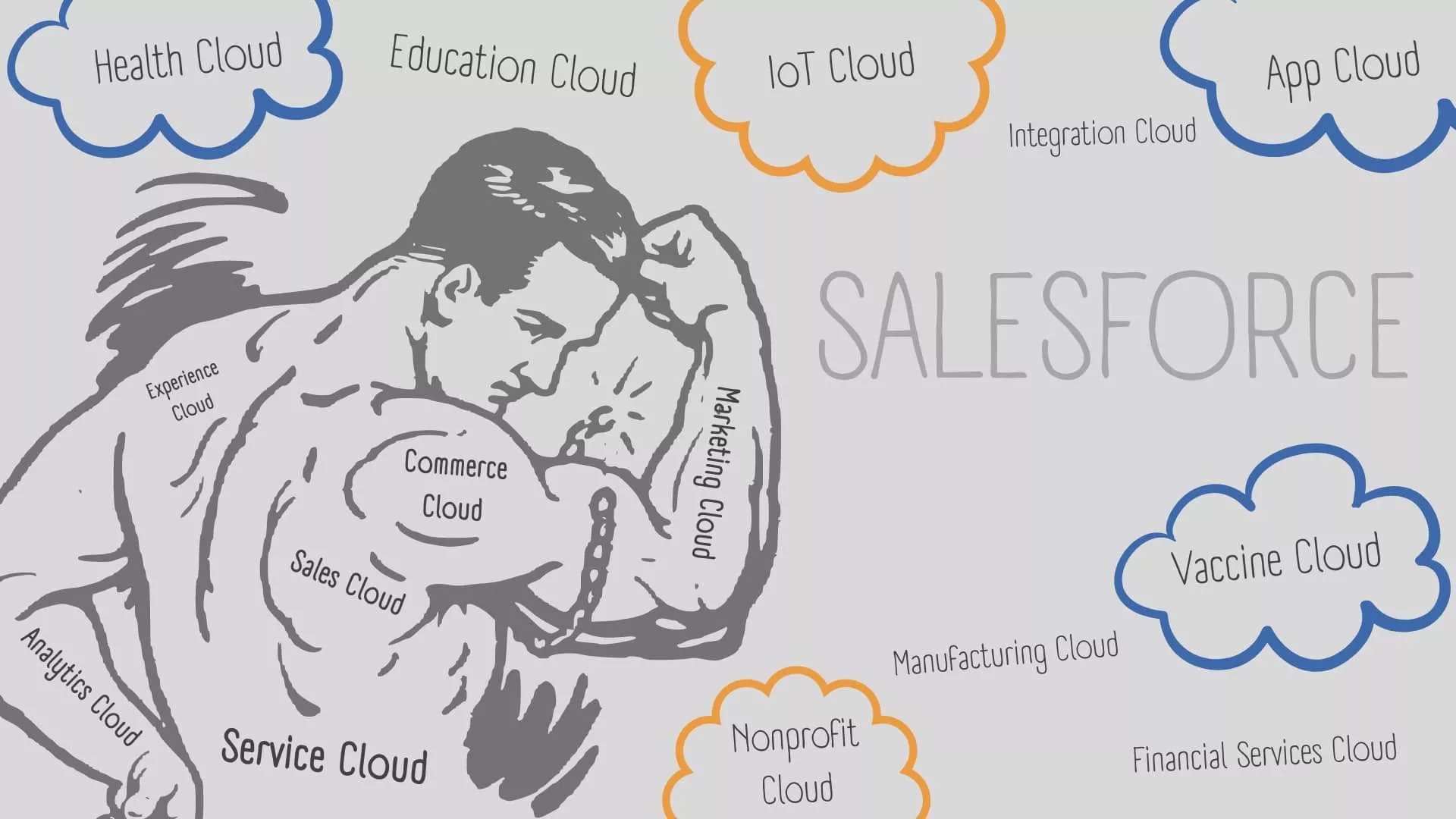
For starters, Salesforce provides 15 types of clouds each designed to address specific aspects of business operations, from sales and customer service to marketing and analytics. These clouds not only facilitate efficient management of customer interactions but also provide rich, data-driven insights to help businesses strategize and grow. Let’s review 6 main types of salesforce clouds:
Salesforce Sales Cloud
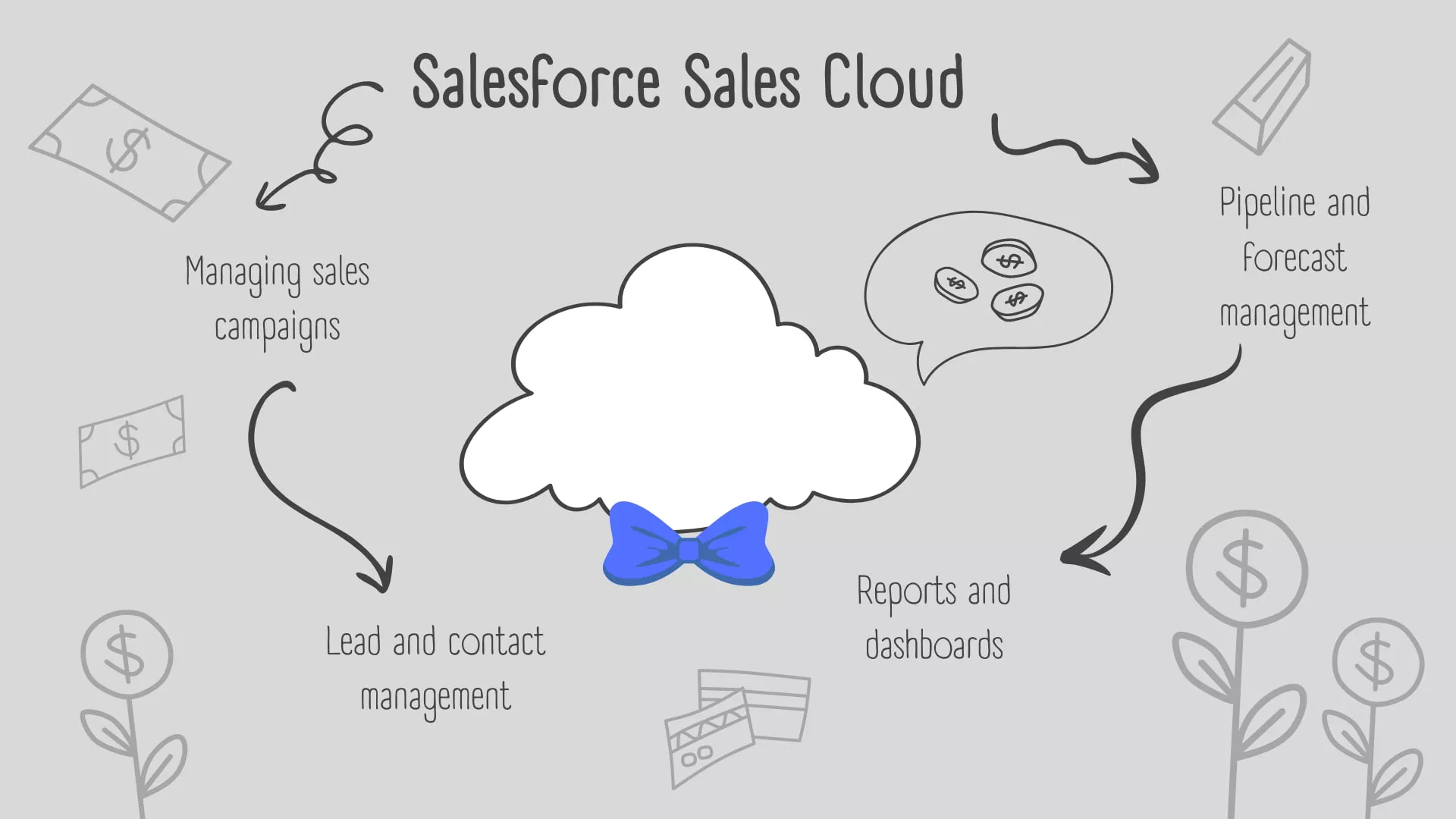
Salesforce Sales Cloud is designed to streamline and enhance the sales processes of businesses. It offers tools to manage leads, track sales opportunities, and close deals more effectively. This cloud solution is tailored to help sales teams stay organized and boost their productivity and has to offer:
- Lead and opportunity management
- Account and contact management
- Sales forecasting
- Workflow automation
- Mobile accessibility
- Reports and dashboards
Sales Cloud is particularly useful for businesses looking to optimize their sales process, improve team productivity, and gain deeper insights into their sales performance.
Salesforce Marketing Cloud
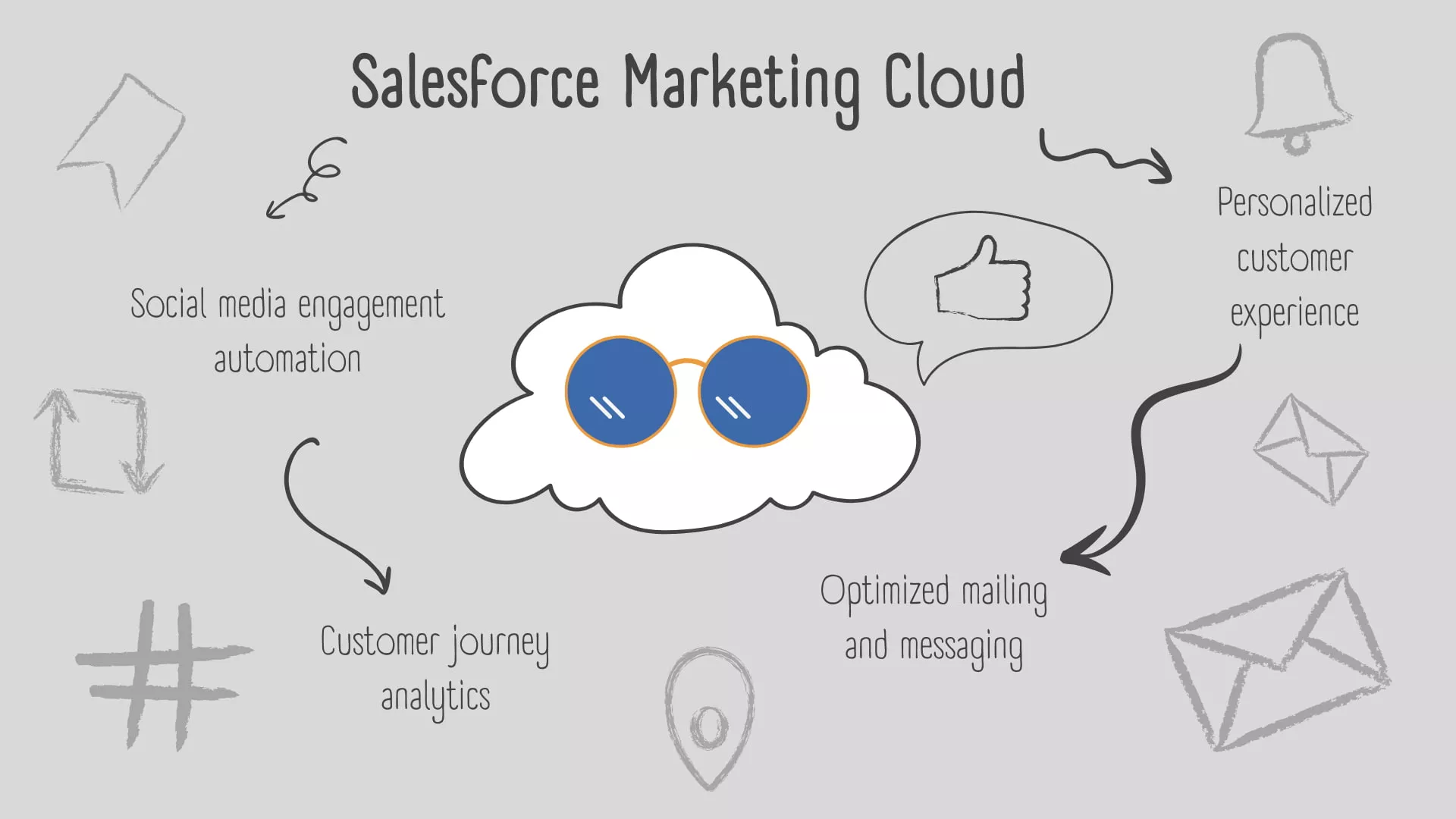
Salesforce Marketing Cloud focuses on providing comprehensive digital marketing tools. It enables businesses to create personalized customer journeys and manage campaigns across multiple channels effectively. It provides:
- Email marketing
- Customer journey management
- Social media integration
- Advertising studio
- Mobile messaging
- Analytics and insights
Marketing Cloud is beneficial for businesses seeking to enhance their digital marketing efforts, personalize customer interactions, and track the effectiveness of their campaigns.
To handle Salesforce development, you need a trusted tech provider to back you up.
Salesforce Commerce Cloud
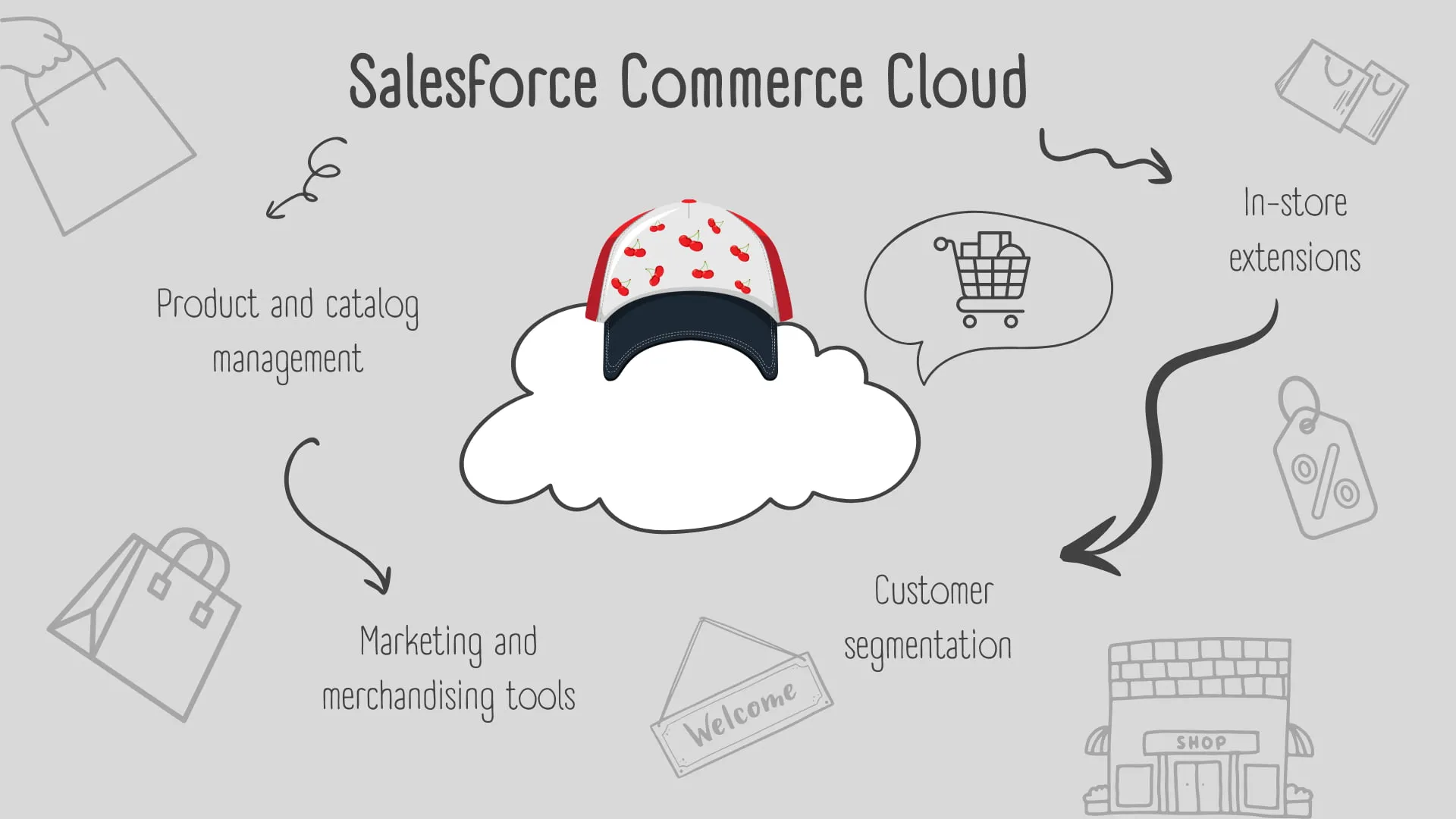
Salesforce Commerce Cloud is aimed at providing businesses with e-commerce solutions. It helps in creating personalized shopping experiences and managing online sales operations efficiently. It has to offer:
- Unified commerce experience
- Intelligent product recommendations
- Inventory management
- Order management
- Customer insights and analytics
- Mobile optimization
Commerce Cloud is ideal for businesses looking to elevate their e-commerce presence, manage online sales more effectively, and create personalized customer shopping experiences.
To find out more about Commerce Cloud B2B vs B2C difference, read another our blog post.
Salesforce Service Cloud
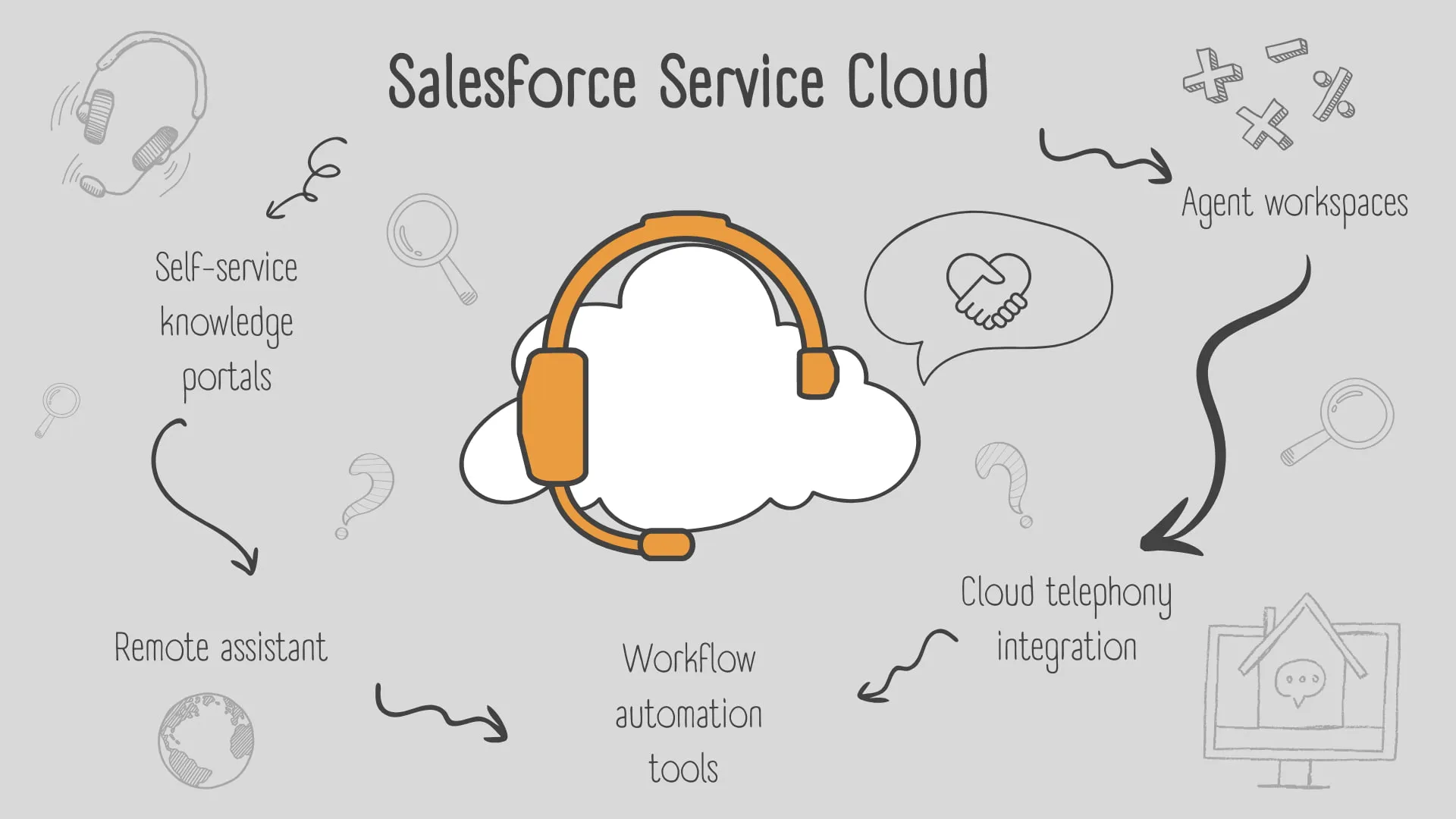
Salesforce Service Cloud is designed to enhance customer service operations. It provides tools to support customer service teams in delivering efficient and personalized customer support, including:
- Case management
- Omnichannel support
- Knowledge base
- Automation and AI
- Service analytics
- Self-service portals
Service Cloud is particularly useful for businesses aiming to improve their customer support, enhance customer satisfaction, and streamline service operations.
Salesforce Experience Cloud
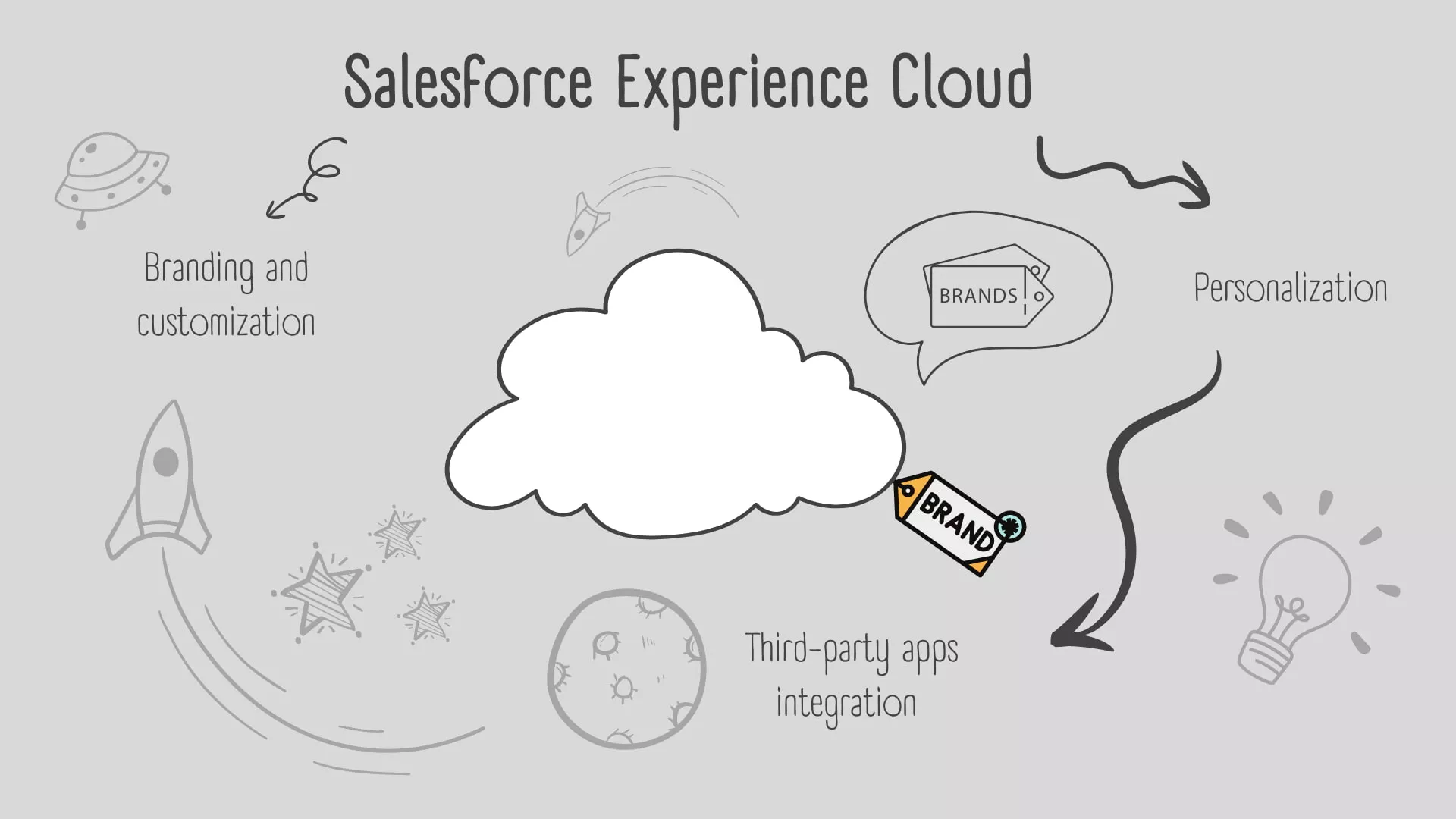
Formerly known as Community Cloud, Salesforce Experience Cloud is focused on building customized digital experiences. It enables businesses to connect with customers, partners, and employees in a dynamic online community environment. It provides:
- Customizable digital experiences
- Community engagement
- Content management
- Integration with Salesforce CRM
- Personalization
- Analytics
Experience Cloud is beneficial for businesses looking to build branded online communities, enhance engagement, and offer personalized digital experiences.
Salesforce Analytics Cloud
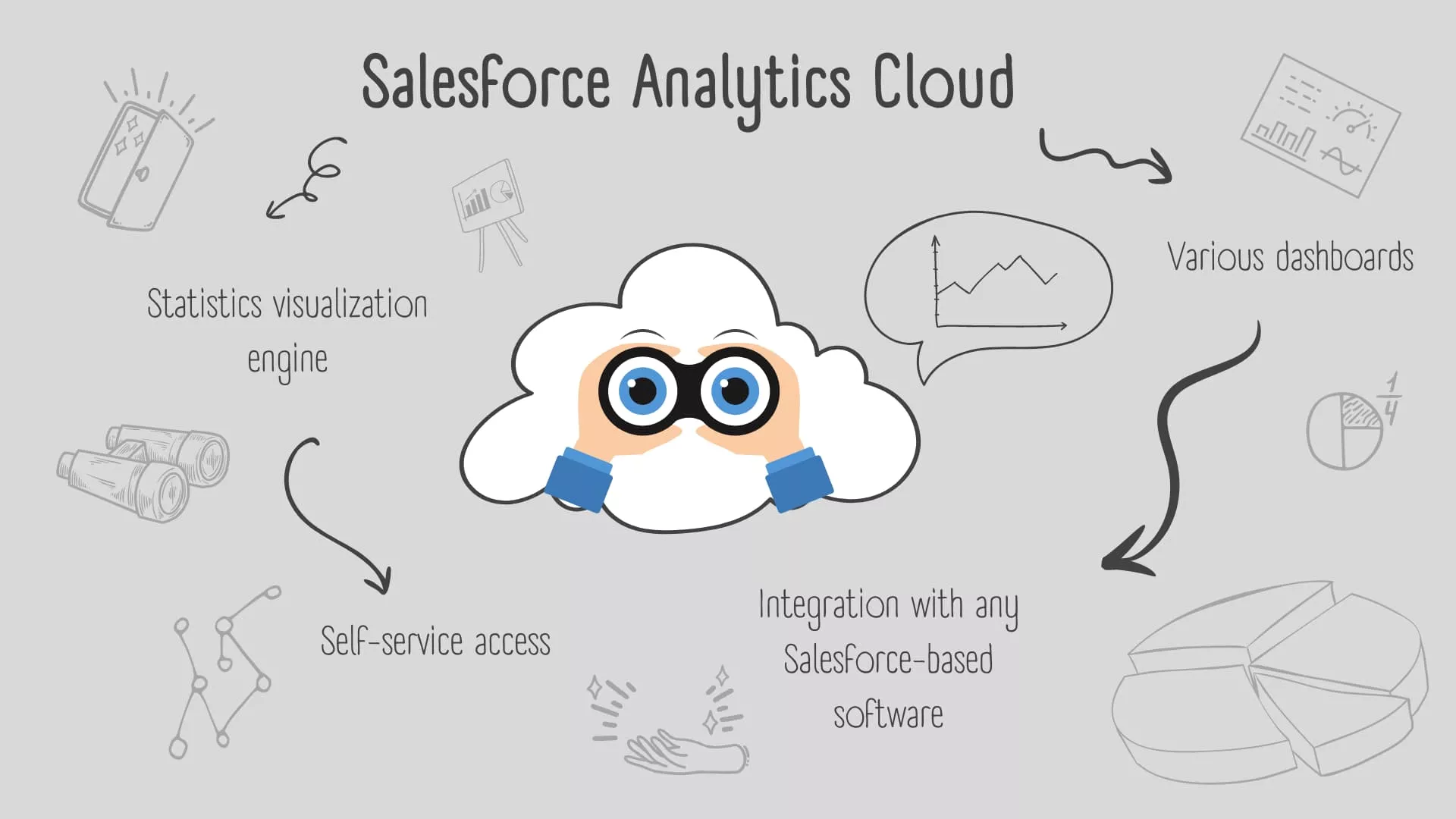
Salesforce Analytics Cloud, also known as Tableau CRM, focuses on data analysis and visualization. It provides businesses with advanced analytics tools to gain insights from their data and make informed decisions, including:
- Advanced data analytics
- AI-powered insights
- Interactive dashboards
- Data integration
- Mobile accessibility
- Data security
Analytics Cloud is ideal for businesses that need to analyze large volumes of data, gain actionable insights, and make data-driven decisions to guide their strategies.
Are you in need of Salesforce development? Synebo team can cover any of your needs and help you enter the market with a perfect-fit solution. Contact us and let’s discuss.
The Other 9 Types of Salesforce Clouds
In addition to the six main types of Salesforce Clouds, there are other specialized clouds offered by Salesforce. Each extends beyond the core CRM functionalities and unique business needs. Here’s an overview of nine additional Salesforce Clouds to consider using to access tailored, industry-specific solutions:
Salesforce Integration Cloud
Salesforce Integration Cloud is designed to streamline the integration of various systems and data sources with Salesforce applications. It offers tools for connecting different software applications, both within and outside the Salesforce environment, allowing for seamless data flow and unified business processes.
Salesforce Integration Cloud is particularly beneficial for businesses that rely on multiple software solutions and need a cohesive system where data and processes are synchronized in real-time. By enabling efficient integration, businesses can achieve more streamlined operations, reduced data silos, and improved decision-making capabilities.
Need information on the implementation of Salesforce in your business environment? Read another our blog post.
Salesforce App Cloud
Salesforce App Cloud is a platform-as-a-service (PaaS) offering that allows businesses to build custom applications tailored to their specific needs. It provides developers with the tools and services needed to create, deploy, and manage applications directly on the Salesforce platform.
Salesforce App Cloud is especially useful for businesses that require unique applications to support specific workflows or business processes. The App Cloud enables these businesses to rapidly develop and deploy custom solutions that integrate seamlessly with their existing Salesforce ecosystem, enhancing overall efficiency and productivity.
Salesforce IoT Cloud
Salesforce IoT Cloud is focused on harnessing the power of the Internet of Things (IoT) by collecting data from devices and sensors and integrating it with the Salesforce platform. This cloud allows businesses to analyze IoT data and use it to enhance customer interactions and business processes.
Salesforce IoT Cloud is particularly useful for companies that rely on IoT devices for their operations, the IoT Cloud enables them to turn vast amounts of data into actionable insights and more personalized customer experiences, ultimately driving innovation and operational efficiency.
Salesforce Manufacturing Cloud
Salesforce Manufacturing Cloud is tailored specifically for the manufacturing industry, offering tools to streamline operations and improve customer engagement. It provides features for managing sales agreements, forecasting, and building stronger relationships with customers in the manufacturing sector.
Salesforce Manufacturing Cloud is highly beneficial for manufacturing businesses looking to enhance visibility across their operations and sales processes. It helps in better aligning sales and operations, improving demand forecasting, and building deeper relationships with customers and distributors.
Salesforce Financial Services Cloud
Salesforce Financial Services Cloud is designed for the finance industry, offering customized CRM solutions for wealth management, banking, insurance, and other financial services. It helps financial institutions manage client relationships more effectively and provides personalized advice.
Salesforce Financial Service Cloud is particularly beneficial for financial services firms aiming to deepen client relationships, improve productivity, and comply with industry regulations. By providing a 360-degree view of clients and streamlining processes, it helps financial professionals deliver more personalized and efficient services.
Salesforce Education Cloud
Salesforce Education Cloud is aimed at educational institutions, offering tools to streamline campus operations, improve student engagement, and manage alumni relations. It helps in creating personalized student experiences and managing the entire student lifecycle.
Salesforce Education Cloud is especially useful for educational institutions seeking to enhance student and alumni engagement, streamline administrative processes, and gain insights into student performance and needs. It enables these institutions to create more connected and personalized educational experiences, driving success for both students and the institution.
Salesforce Nonprofit Cloud
Salesforce Nonprofit Cloud is designed to meet the unique needs of nonprofit organizations. It offers tools for managing donor relationships, fundraising, program management, and more, helping nonprofits to drive greater impact.
Salesforce Nonprofit Cloud is particularly beneficial for nonprofit organizations looking to streamline their operations, engage more effectively with donors, and manage programs more efficiently. By providing a comprehensive view of their operations and donor engagements, it helps nonprofits increase their impact and foster deeper relationships with their supporters.
If you’re interested in discovering about 5 examples of the best CRM for nonprofits, read another our blog post.
Salesforce Health Cloud
Salesforce Health Cloud is tailored for the healthcare industry, providing tools for patient management, care coordination, and personalized patient engagement. It enables healthcare providers to deliver more connected and personalized care experiences.
Salesforce Health Cloud is particularly useful for healthcare organizations aiming to streamline patient management, enhance patient engagement, and coordinate care more effectively. By offering a holistic view of each patient and facilitating communication among care teams, it helps healthcare providers deliver more personalized and efficient care.
Salesforce Vaccine Cloud
Salesforce Vaccine Cloud is a specialized solution developed to aid in managing vaccine administration logistics and outreach. It provides tools for managing vaccine inventories, scheduling appointments, and tracking patient vaccination status.
Salesforce Vaccine Cloud is particularly useful for healthcare providers, public health organizations, and government entities involved in vaccination efforts, this cloud helps streamline the complex logistics of vaccine distribution and administration. It enables these entities to efficiently manage vaccine campaigns, ensuring effective outreach and follow-up, and ultimately contributing to public health efforts.
How to Choose the Right Salesforce Cloud?
Choosing the right Salesforce Cloud from the array of available options can be a challenging task, especially considering the variety of 15 main and additional types. Here’s the list of criteria by which you can determine your need for a particular Salesforce cloud and, what’s also important, make the most use of your choosing in the future:
- Your core business needs: Identify what your main business requirements are. Is it sales efficiency, customer service, marketing automation, or something more specific to your industry?
- The specificity of your industry: For businesses in sectors like healthcare, education, or finance, Salesforce offers industry-specific clouds such as Health Cloud, Education Cloud, and Financial Services Cloud. Choose a solution that aligns with your industry’s unique requirements.
- Size and complexity of your business: Smaller businesses might benefit from a more straightforward CRM solution like Salesforce Essentials, while larger organizations might require the advanced features of Sales Cloud or Service Cloud.
- Customization and integration needs: Determine the level of customization and integration your business requires. Salesforce offers various options with varying degrees of flexibility and compatibility with other systems.
- Assess the required functionality: Each Salesforce Cloud offers different functionalities. For instance, if e-commerce is a priority, Commerce Cloud might be the best fit. If improving customer service is the goal, then Service Cloud could be more appropriate.
If you’re unsure what cloud can benefit your business, need Salesforce consulting, or looking for any other assistance with Salesforce, don’t hesitate to reach out to Synebo. Our team of expert Salesforce engineers is ready, willing, and able to make an impact.
Final Take
Salesforce has been a top 1 CRM platform for more than 10 years already. So, knowing its clouds and understanding its business usefulness is essential. From enhancing sales processes with the Sales Cloud to revolutionizing healthcare management with the Health Cloud, each Salesforce Cloud is meticulously engineered to address unique challenges and objectives.
Do you need assistance from a trusted vendor of Salesforce services? Consider Synebo as your primary choice. With over 1000 projects completed, 250+ Salesforce certifications, and over 8 years on the market, we help you with choosing a Salesforce cloud and creating a solution based on it. Drop us a line, and let’s discuss business opportunities!


